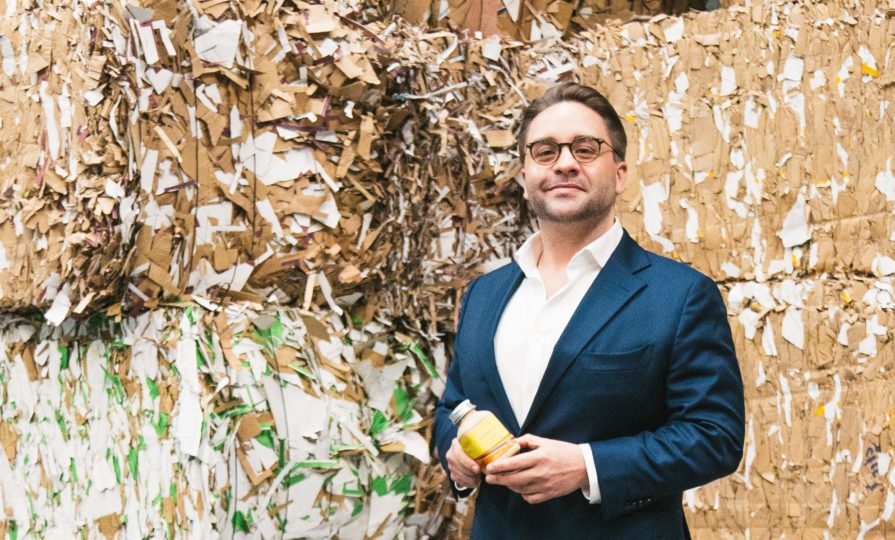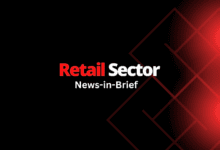We need to stop relying on plastic, but can retailers ever be paper-based?
By David MacDonald, owner and CEO of Cullen Eco-Friendly Packaging, EY Entrepreneur of the Year Transformational Leader and Wired Trailblazer of the Year 2022. His company, Cullen Eco-Friendly Packaging, is on track to make one billion sustainable alternatives to plastic packaging a year, and exports to 34 countries globally.

We should be able to feel optimistic about the future. To do that, we have to solve some of the biggest obstacles that we have. One of those dark clouds hanging over retail is plastic waste, and I’m committed to helping solve that problem.
There’s no doubt that it’s a major issue. Too little recycling happens, a mere 9% of all plastics, according to the Organisation for Economic Co-operation and Development’s (OECD) first Global Plastics Outlook in 2022.
Packaging is a major culprit, accounting for 40% of all plastics. And retailers play a significant role in environmental damage caused by plastic packaging. In 2019, UK supermarkets produced nearly 900,000 tonnes of plastic packaging, almost all of it ending up as waste, according to a report from the Environmental Investigation Agency (EIA) and Greenpeace UK.
Wake-up calls are coming not just from environmental problems and consumer pressure (as it did with plastic straws) but also from government legislation. There’s a real risk that retailers (and their customers) could be forced to pay over the odds to fix the issue. In fact, that is already starting to happen with the incoming Extended Producer Responsibility (EPR) tax. So why not try a different tack and start solving the problem now proactively?
Dare to imagine a better alternative
We can reduce plastic pollution by 80% by 2040 if countries and companies make deep policy and market shifts. The UN is pushing for plastic avoidance as the only real solution. Here’s the rub: an eco-friendly alternative must also have the qualities of being commercially viable, durable, convenient – and able to be mass manufactured quickly in the vast quantities needed – just like plastic.
One of the most viable alternative materials is paper. Well, moulded fibre to be exact it is entirely natural, recyclable and compostable, it has been successfully used in packaging at scale for decades. Innovation, design and engineering has meant that it can be sculpted into highly nuanced, durable packaging types similar to plastic and can be produced at scale.
My company, Cullen Eco-Friendly Packaging, is one of the global leaders in moulded fibre packaging, and I can say with confidence that all the major retailers, as well as food and drink manufacturers are looking to paper-based products as a key way to replace plastic packaging at scale.
Breaking the mould
Cullen Eco-Friendly Packaging’s latest paper-based innovation, The Fibre Bottle is an example of a new wave of moulded fibre packaging solutions. This patented creation offers a sustainable, entirely recyclable and compostable alternative to single-use plastic bottles and pouches for storing dry goods like horticultural products, vitamins, spices, pet foods and household cleaning products.
The remarkable aspect of The Fibre Bottle is its scalability, enabling large-scale production and presenting a tremendous opportunity to eliminate approximately 300 million plastic pieces from store shelves each year, starting right now.
Paper-based alternatives like this are superior to anything else, particularly the ‘less worse’ paper-plastic hybrids, because they’re entirely circular, our Fibre Bottle is made using the paper offcuts from our global corrugate business and is 100% plastic free. So it’s not just a sustainable circular manufacturing process, but also one that gives us raw material in vast quantities to manufacture at scale.
To produce the Fibre Bottle and the 1.2 billion plastic free products and packaging we have sold in the last two years, our in-house engineers design and build our own bespoke, patented mass manufacturing machines and tooling. This is a vital part of the innovation process for creating plastic packaging replacements, that coupled with our design capabilities, the Cullen team can viably create a sustainable, plastic alternative for our clients within 1 month.
Provoke a supply chain reaction
Retailers and brand owners have real power over their supply chains, but when it comes to sustainability, instead of imposing change on the supply chain, they are seeking to work collaboratively, being methodical and cooperative to get the right solutions in place at the right time and cost.
Despite the urgency, getting the switchover right is important to make sustainable alternatives stick long term and not fall at the first hurdle.
In practice, the best way to do this is for retailers to share sustainability plans with the supply chain and with manufacturers like us at Cullen Eco-Friendly Packaging. Collectively we can innovate and support the adoption of sustainable solutions by utilising our simple five step process that can replace plastic within 1 month.
This type of collaboration between retailers, manufacturers and the supply chain is critically important, but it’s also sensible, straightforward and easier than you might think.
Let’s make the future one we’re excited by
In the future, single-use packaging could be a thing of the past. This will involve a big push from retailers and brands to make the arrangements so that paper based materials are used.
So many viable, affordable options are already available, Cullen Eco-Friendly Packaging have produced over 1.2 billion plastic free products and packaging in the last two years, and are on track to increase capacity to 1 billion pieces per year.
Not every plastic packaging replacement has been designed yet, of course, but the good news is that much of the capability is there. Every week our innovation team, as well as our machine and tooling design team, is conceiving a new replacement to increase plastic avoidance.



